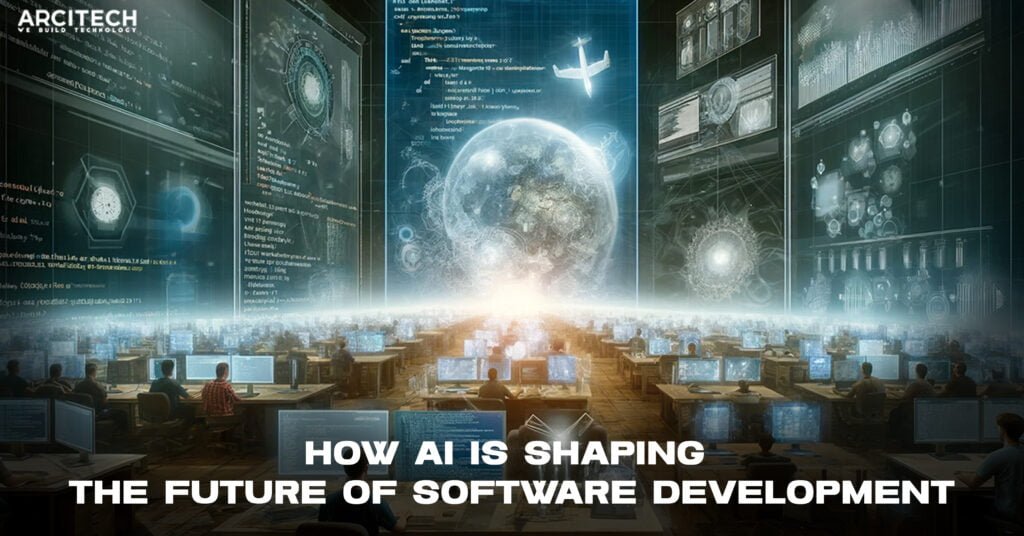The Evolution of Software Development with AI Automation
The field of software development industry has always been changing, few technological advancements have had the same significant influence as artificial intelligence (AI), particularly in the field of natural language processing (NLP). A revolutionary change has occurred with the incorporation of natural language processing (NLP) into software development tools. This has changed the way developers work with programming languages and the software creation lifecycle itself.
The Rise of NLP in Software Development
NLP technology has progressed to the point where AI systems can generate and comprehend writing that resembles that of a human. This capacity involves more than simply information processing; it also involves simplifying difficult ideas. For example, natural language searches can now be converted into functional code using AI-powered tools. With this innovation, aspirational developers who may lack traditional coding skills but can clearly express their software needs would have easier access to the development community. It speeds up the process for seasoned engineers, cutting down on the amount of time spent writing boilerplate code and freeing them up to concentrate more on creative, difficult, and problem-solving issues.
Consider a situation where an AI tool converts a developer’s plain English description of a function or feature into syntactically accurate code. GitHub Copilot, which is powered by OpenAI’s Codex, is an example of a platform that makes this a reality, not a scenario from the far future. These tools provide code recommendations for entire lines or blocks that may be added straight into projects, cutting down on development time and possibly lowering the chance of human error. Source
AI Automation Beyond Code Generation
However, AI plays a more significant role in software development than only producing and comprehending code. These days, AI automation is essential for testing, debugging, and deployment, among other parts of the development process. Testing technologies powered by AI are capable of writing and running tests automatically, analyzing the data, and even spotting any defects before they cause issues. In addition to guaranteeing a higher-quality result, this proactive approach to quality assurance enables developers to focus on more strategically important activities.
Moreover, the deployment stage of software development is seeing a major surge of AI applications. Based on user interaction, system load, and other variables, automated deployment solutions that are coupled with AI can predict when it is ideal to deliver updates. In order to promptly undo modifications if something goes wrong and preserve system stability and uptime, they can also keep an eye on performance after deployment. Source
Enhancing Developer Productivity and Creativity
The intent of integrating AI into software development tools is to make the process not only faster but also more intelligent. AI may offer insights based on previous code, recommend optimizations and enhancements, and even assist developers in swiftly deciphering complex codebases. This degree of AI tool support increases developer productivity and promotes innovation. Developers can now concentrate on coming up with original solutions to challenging issues rather than being bogged down by repetitive duties.
Programming is also made more accessible with AI technology. By granting non-experts the opportunity to create software, they level the playing field and increase the number of people who can contribute to technological innovation. Innovation requires a wider diversity of ideas and solutions, which is what this inclusivity promotes.
The Future Trajectory
With even more advanced tools on the horizon, software development is expected to further integrate AI in the future. The next step is using AI to help with decision-making as well as coding. Consider artificial intelligence (AI) technologies that can advise developers on algorithm choices or architectural choices depending on the particular needs of a project.
Furthermore, as AI tools grow, they will be able to handle larger and more important parts of projects, which could eventually lead to the software development of whole programs with little to no human coding. This possibility brings up significant issues about the function of developers and the competencies that upcoming developers will require.
Conclusion
The evolution of software development through AI automation is reshaping the landscape in profound ways. By automating routine tasks. Enhancing productivity, and lowering entry barriers, AI is not just changing how we develop software but also who can develop it. This transformation is not without challenges, particularly in terms of the changing skill sets required for future developers and the ethical implications of AI in coding. Nonetheless, the potential benefits—increased efficiency, enhanced creativity, and broader participation in software development—are immense. As we continue to harness these advanced tools, we are paving the way for a more innovative and inclusive future in software development and creation. If you’re seeking similar services in programming, contact Arcitech.ai. We assure you the best and most innovative solutions for your business.

